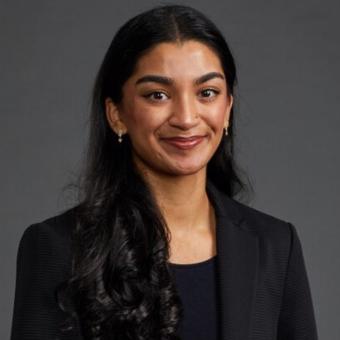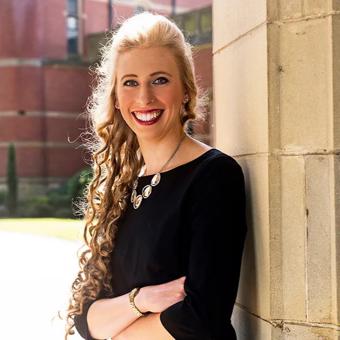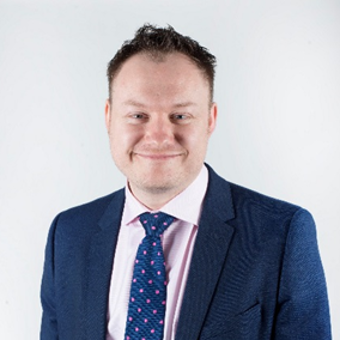Sadie Seabrook is one of the UK’s leading practitioners in the field of police law. She talks to The Brief about defending hard-working officers in a rapidly changing environment, the value of her background as a barrister when preparing litigation, and the importance of finding an area of practice that really excites you.
“I am passionate about defending claims brought against our decent, hard-working police officers who are doing a really difficult job in such challenging times,” says Sadie Seabrook, legal director in the Police Team at Weightmans. “I honestly don’t know how they are able to handle the situations that they are faced with every day.”
Seabrook joined Weightmans LLP, the only firm in the country to be ranked Band One for defendant police law work by Chambers and Partners, from Clyde & Co in January 2024. Seabrook has herself been ranked by Chambers and Partners for the past seven years.
She handles high-profile, complex cases of a sensitive nature, defending police forces across the country and advising their insurers in cases, including:
- A million pound claim for malicious prosecution arising from a quashed murder conviction.
- Claims brought under the Human Rights Act 1998 for alleged failures by police to adequately investigate claims of sexual assault, child exploitation and modern-day slavery.
- Claims for catastrophic injury arising out of the use of firearms.
- Allegations of misfeasance arising from sexual relationships between on-duty police officers and members of the public.
Seabrook also acts for police forces defending complex and high-value personal injury claims brought by serving officers.
Sitting within firms’ insurance practices, police law is a niche specialism, and only 11 firms are listed by Chambers and Partners for defendant work, with Weightmans LLP being the leading firm in this area of law.
The firm’s Police Team has around 80 lawyers nationwide, with Seabrook being based in the firm’s head office in Liverpool. The team advises over 40 police clients and their insurers across the length of the country, from Police Scotland down to Devon and Cornwall. It also supports and works alongside police partners such as the National Crime Agency and the National Police Chiefs’ Council.
Seabrook’s current clients include the Metropolitan Police Service, West Midlands Police, North Wales Police, South Wales Police, Greater Manchester Police, Lancashire Constabulary, City of London Police and Cleveland Police.
The department is constantly growing, she says, with claims against police forces and officers on the rise, as well as a growing backlog of misconduct cases.
Claims culture
There has, Seabrook continues, been a significant increase in claims against the police in the last five-to-seven years. This growth has been driven by claims via the Human Rights Act 1998, particularly allegations of failure to investigate alleged rapes, sexual assaults and domestic violence. Claims under the Equality Act 2010 and Data Protection Act 2018 have also increased.
In addition, the increase is being driven by claimants and their legal representatives becoming more litigious when seeking damages against the police. This growth in claims has coincided with a societal shift.
“There is a marked difference in how the public view and respect the police compared to ten or 20 years ago,” Seabrook says.
The police are now constantly coming up against people who just don’t want to interact with them and will actively resist any police involvement or intervention. I’m not just talking about criminals, but in general.
Although Legal Aid Agency funding is now significantly restricted in actions against the police, this has made no discernible difference to the uptick in claims, with more claimant firms now funding claims by way of conditional fee arrangements.
Misconduct
Seabrook specialises in civil litigation, but the Police Team at Weightmans LLP also advises forces on operational matters, including misconduct by police officers, securing domestic violence protection orders and stalking protection orders, and dealing with shotgun licence appeals.
In addition, the team acts for police forces in inquests and inquiries, with some of the most notable including the inquests following the London Bridge terrorist attack, the Guildford pub bombings, the Fishmongers’ Hall attack, the Undercover Policing Inquiry and the Covid inquiry.
Police misconduct is a particular growth area. “Most police forces have a significant backlog of misconduct cases at the moment contributed to by the nationwide vetting review post-Wayne Couzens,” Seabrook explains.
“As a team, our growth has been focused in this area to meet that demand. We have made a number of significant appointments recently to ensure we are able to assist and advise Chief Constables on all misconduct matters.”
She is, she continues, not just passionate about defending “hard-working police officers”.
“I am also passionate about helping to ensure that police officers who shouldn’t be in the job are weeded out, whilst also identifying those officers who aren’t performing at the level they should be so that they can be re-trained, supported and able to continue in their careers.
It is very much a collaborative relationship between our lawyers and our police clients. We’re there to advise and assist, but also to provide feedback where we believe improvements are needed.
“This can include assistance in the training of officers by addressing the common mistakes we see in our work and advising on what can be done to iron out those mistakes, thereby reducing the number of claims police forces receive,” she continues.
Legal training
Seabrook’s enthusiasm for police work can be traced back to a year she spent as a paralegal at Irwin Mitchell in Sheffield between 1998-1999, where she was able to work on police-related cases, albeit from a claimant perspective. “I really enjoyed that experience and it got me interested in the work police do and how the exercise of police powers can give rise to civil claims” she says.
She studied law at Newcastle University, graduating in 1996. Seabrook decided during that time to train as a barrister, having excelled as a finalist in the university’s Mooting Competition.
Following her degree, she completed the Bar Vocational Course during which time she won the Lincoln’s Inn Mooting Competition.
Following her year as a paralegal, she completed a common law pupillage, an experience that led her to realise “I really didn’t enjoy practising criminal or family law – neither suited me at all – but I did enjoy the civil cases.”
Having worked in a great team at Irwin Mitchell and enjoyed the experience, Seabrook found practice at the Bar to be “quite isolating” and, although she had an opportunity to return to work at Irwin Mitchell as in-house counsel, she chose instead to undertake defendant work and joined the insurance team at Manchester firm Halliwells as in-house counsel to the insurance department.
In 2010 the Halliwells insurance team was acquired by Barlow Lyde & Gilbert, which in turn went on to merge with Clyde & Co, where she remained until moving to Weightmans LLP last year.
Their day in court
Seabrook says her training as a barrister is a real advantage when organising her cases for trial.
“I am able to prepare a case with a real understanding of how, evidentially and procedurally, the case is likely to play out.” she says.
“I have an understanding of what could go wrong, and what needs to be done to ensure that the best evidence is before the court in the best possible format. In police cases this is particularly challenging, as they are frequently before a judge and a jury.”
Changing legal backdrop
The nature of police law means that the landscape is constantly changing and evolving, Seabrook points out – both in terms of the law itself but also the current environment within which officers operate.
“Policing, and therefore our work, is significantly influenced and impacted by what is going on in the country generally, from what’s on the front page of the papers to what our politicians are debating in the House of Commons.
In addition, police law is constantly evolving to respond to our changing society and the new and innovative causes of action that are being pursued, be that under the Human Rights Act, under the Data Protection Act or in common law negligence.
The criminal law, she continues is likewise always changing. “This impacts upon our role because, although we don’t practice criminal law, we need to keep up to speed on developments to be able to properly advise police forces and their officers in the civil arena,” she says.
Another huge change in the last few years has been the introduction of body-worn video cameras and, in parallel, the ubiquity of smartphones with video recording capability among the public. This has proved to be a double-edged sword.
“It’s made a big difference but it’s not a silver bullet as it doesn’t always capture everything and often doesn’t capture context,” she says.
The next generation
Seabrook’s commitment to her field of practice is clear, and she says that any lawyer setting out on their career should seek out an area about which they feel similarly passionate.
“When I think of all the other areas of law that I’ve worked in – criminal, family, commercial, property and general civil – I didn’t find any of them as exciting and as challenging as this.
“You must find something you enjoy, and I also think that it is important that you feel that you’re making a difference, even in a small way. There is nothing better than getting an email from a police officer thanking you for your time and assistance in guiding them through a challenging case.
“For people wanting to come into the law, you can’t only be focused on the salary. It’s about what excites you as an individual, and you must find out what that is.
When a new case lands on your desk do you want your heart to sink, or do you want to feel excited to get stuck in?
Visit
Connect with Sadie Seabrook via LinkedIn











